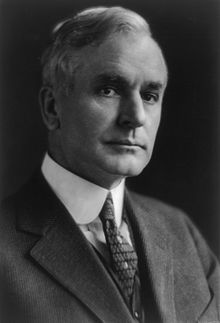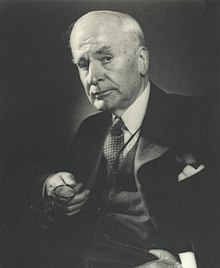Cordell Hull
Cordell Hull (born October 2, 1871 in Olympus , Pickett County , Tennessee , † July 23, 1955 in Bethesda , Maryland ) was an American lawyer and politician ( Democratic Party ). He was US Secretary of State from 1933 to 1944 . In 1945 he received the Nobel Peace Prize for his help in founding the United Nations .
life and work
Cordell Hull was born in 1871 to William Paschal Hull (1840-1923) and his wife Mary Elizabeth Riley (1841-1903). He studied at the Montvale Institute in Celina , at the National Normal University in Lebanon , Ohio , and the Law School of Cumberland University until 1891 law . In 1890 he was a delegate to the Tennessee Democratic Party Convention; after his studies he worked as a lawyer and judge . In 1893, at the age of 22, he was first elected to the Tennessee House of Representatives. In 1898, Hull served in Cuba during the Spanish-American War . In 1917 he married Rose Frances Whitney. The marriage remained childless.
Political development
From 1907 to 1921 Hull was the elected representative of Tennessee in the House of Representatives in Washington and advocated the formation of the League of Nations after the end of the First World War as a congressman . In 1930 he was elected to the US Senate , in which he remained from March 4, 1931 to March 3, 1933.
From March 4, 1933, Cordell Hull was Secretary of State in the cabinet of Franklin D. Roosevelt . In December of that year, at the Congress of the American States in Montevideo , he promised that the United States would no longer interfere in the internal and external affairs of the States of America. This political course was realized in 1934 with the revocation of the Platt Amendment of 1901, which provided for the possibility of the USA to intervene on the entire American continent. In 1934 the US troops left Haiti and in 1939 the interventions against Panama were also ended. In 1936 he defended the sending of the American Olympic team to the Olympic Games in Berlin and the associated patronage of the American presidents in a press conference, pointing out that this was always done without addressing the special situation in Germany .
In 1939, under pressure from Cordell Hull, President Franklin D. Roosevelt withdrew from his initial willingness to accept some of the mostly German Jewish refugees from St. Louis . The refugee ship, whose passengers had been denied entry to Cuba, had to return to Europe. About a third of the passengers were murdered in German concentration camps .

As a result of the capture of Manchuria by Japan and the Second Sino-Japanese War that followed in 1937, US foreign policy concentrated on the East Asian region. In 1941 Cordell Hull negotiated unsuccessfully with the Japanese government over the rights of the Chinese. With the attack on Pearl Harbor on December 7, 1941 and the declaration of war by Germany and Italy on the United States four days later, the United States also became involved in World War II .
Hull himself had a difficult relationship with Roosevelt. The president preferred his Secretary of State Sumner Welles , who was actually Hull's subordinate. So Roosevelt excluded Hull from several important negotiations in Welles' favor. Nonetheless, Cordell Hull held his office as Secretary of State until he was recalled. Contemporary voices describe him as a hard-working, colorless bureaucrat. His public speaking skills were rated as poor.
Struggle for the peace order for Germany after 1945
During the Second World War, Cordell Hull was primarily concerned with drafting the treaties for the formation of the United Nations , which were to form a basis for a world order after the war. On January 1, 1942, the declaration for the United Nations was signed by the "Big Four" USA, China, USSR and Great Britain, which 22 other nations joined. The main features of the UN Charter were adopted in 1944 at the Dumbarton Oaks Conference in the presence of representatives from 35 nations. Improvements to the charter were then decided between Franklin D. Roosevelt, Josef Stalin and Winston Churchill at the Yalta Conference in 1945 . Cordell Hull played a key role in the preparations for both meetings.
At the Moscow Conference in October 1943, Cordell Hull first spoke out in favor of court courts against the main German war criminals of World War II; this option was given up in favor of the Nuremberg trials . One day after US Treasury Secretary Henry Morgenthau presented the so-called Morgenthau Plan to President Roosevelt in 1944 , Hull and British Foreign Secretary Anthony Eden protested this idea, calling it "a crime against civilization".
On November 30, 1944, Cordell Hull resigned as Secretary of State, but was sent by Roosevelt's successor Harry S. Truman as a US delegate to the founding conference of the United Nations. In 1947 he received the Medal for Merit , at that time the highest civilian award in the USA. He died on July 23, 1955 at Naval Hospital in Bethesda, Maryland.
The Hull Glacier and Hull Bay are named in his honor in Marie Byrd Land in West Antarctica . His home state of Tennessee also has Cordell Hull Birthplace State Park , Cordell Hull Lake, and a bridge over the Cumberland River in Carthage, Tennessee, is also named after Cordell Hull.
Works
- Cordell Hull. Memoirs (1948).
literature
- Bernhard Kupfer: Lexicon of Nobel Prize Winners . Patmos Verlag Düsseldorf 2001, ISBN 3-491-72451-1 .
- Julius W. Pratt: Cordell Hull, 1933-1944 . 2 volumes, 1964.
- Michael A. Butler: Cautious Visionary: Cordell Hull and Trade Reform, 1933-1937 . Kent State University Press, Kent, Ohio 1998.
Web links
- Cordell Hull in the Biographical Directory of the United States Congress (English)
- Information from the Nobel Foundation on the award ceremony in 1945 to Cordell Hull (English)
- Hull, Cordell at the Encyclopedia Britannica
- The Papers of Cordell Hull ( Memento of July 28, 2007 in the Internet Archive )
- The Cordell Hull Museum, near Byrdstown, Tennessee, focusing on the life and work of Hull
- Cordell Hull in the Miller Center of Public Affairs of the University of Virginia (English)
- Newspaper article about Cordell Hull in the 20th century press kit of the ZBW - Leibniz Information Center for Economics .
Individual evidence
- ↑ Arnd Krüger : The Olympic Games 1936 and the world opinion: their foreign policy significance with special consideration of the USA. Berlin: Bartels & Wernitz, 1972 (= Sports Science Papers Vol. 7). ISBN 3-87039-925-2 , pp. 184f.
- ^ David Kennedy: Freedom from Fear - The American People in Deppression and War 1929-1945. Oxford 1999, p. 507.
| personal data | |
|---|---|
| SURNAME | Hull, Cordell |
| BRIEF DESCRIPTION | US Secretary of State and Nobel Prize Laureate |
| DATE OF BIRTH | October 2, 1871 |
| PLACE OF BIRTH | Olympus , Tennessee |
| DATE OF DEATH | July 23, 1955 |
| Place of death | Bethesda , Maryland |






